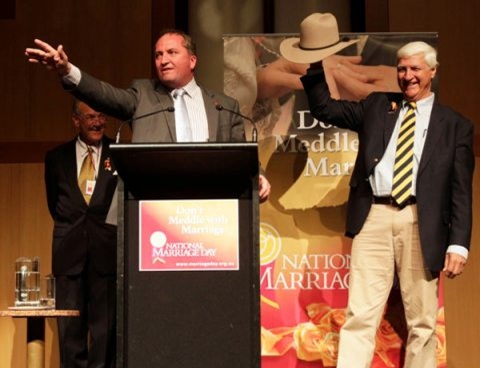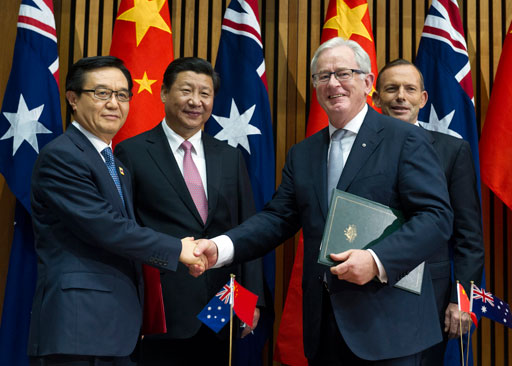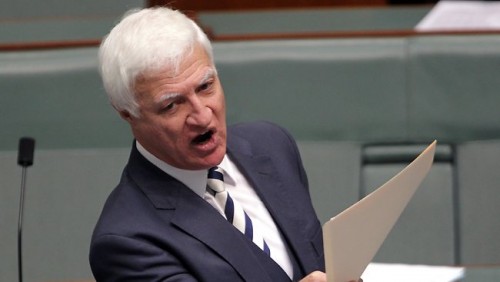Bob Katter is a man I’ve never paid much attention to. He’s on the other side of the country and might as well be on the other side of the planet as far as I’m concerned. But when a friend sent me the link to Katter’s speech in Parliament last week on the China-Australia Free Trade Agreement I sat up and took notice. It’s a gem. It sparkled. You need to see it.
You think you are deceiving the people of Australia. You are not. When they hear ‘free trade deal’, they hate you. Understand that, because I might not be an expert in a number of fields, but after 41 years of straight wins in pretty hostile territory, I can tell you that I know a little tiny bit about politics. I sat at the feet of the great master, Bjelke-Petersen. So if you are not interested in governing the country, if you are not interested in helping your country, maybe you might just think about your survival.
I feel sorry for the LNP. They somehow think that Australia is this big, huge country and that it can produce a magnificent amount of agricultural production. It most certainly can produce a lot more than it is producing. But it is not a big, huge agricultural country at all. There is 53 per cent of Australia that is designated as desert and 23 per cent is designated as Indigenous lands. Since the governments of Australia will not give title deed to those lands, they are sterilised. That is 76 per cent gone. There is seven per cent that is national parks. So, if you take out that 83 per cent, there ain’t a lot left.
The concept that huge areas of land will produce huge areas of food—sorry; that is wrong. There are a few thousand hectares, maybe 30,000 hectares, of land that is producing about a quarter of Australia’s beef production. They are called lot feeders. Basically the cattle do not wander around chewing grass. That is not the way beef is produced anymore in America or in Europe or in Australia. It is done in lot feeders. So you have a different concept altogether, where you do not need huge areas of land. Your competitive advantage is in that lot feeder. That is where the action comes. You have a competitive advantage in that area.
Somehow they think, ‘There are millions of people in South-East Asia, and we’re going to be able to sell all this food to them.’ Mr Deputy Speaker, I would refer you to the statistics. In fact, there is a pretty good chance that we will be importing food from those countries. Let me be very specific. When I stood up in this place 15 years ago and said that this market fundamentalism, this free market rubbish, will destroy your country, I said that Australia could become a net importer of food. Every 10 years, the imports increase at 103 per cent and the exports increase at 21 per cent. You do not have to be Albert Einstein to figure out that the graphs will soon cross.
Mr Deputy Speaker, you must understand that, if every Chinese city had two 20-storey buildings with tanks on each storey, then they could produce all of the protein requirements for China. They do not have to buy any of our beef. They do not have to buy any of our seafood product. In fact, if you look at a graph of the increase in seafood production in China, if you extrapolate that graph on for about 30 or 40 years, in theory all of the world’s protein would be coming out of the prawn and fish farms in China.
I am fascinated by how this is going to help Australia. The last speaker, the member for Lyne, touted the beef industry. I do not know if he knows anything about it. I rather doubt that he does, but he touted the beef industry. Well, let us have a look at what this free trade deal does for the beef industry. We sell our beef at the present moment at $2 a kilogram. If you look at the average price, it is a lot less than that, but I will take $2 a kilogram. Its 10 per cent tariff has been abolished, so that is a 20c advantage we get. The beef sells over there for $32 a kilogram. Those are the figures that have been given to me. But now the Australians are going to have a terrific advantage of 20c, so it is $31.80 now. Jeez, that will lead to a huge increase in the benefits for the beef producers of Australia! A difference between $32 and $31.80, and the member of parliament who sits beside me here, the member for Lyne, seriously touted that as something that is going to help the beef industry? Why doesn’t he do his homework? Why does he just take the drivel that comes from the frontbench? And the drivel that comes from the frontbench is dictated by the giant corporations that bankroll the mainstream parties.
Having dealt with the LNP, we will move on now to the ALP. If ever there was a day on which ‘Red Ted’ Theodore would turn in his grave and the founders of the labour movement would spit upon the people that sit in this House and call themselves Labor members, today is the day. When I walk out of this place, there is a magnificent portrait of a bloke called Charlie McDonald. Charlie McDonald was the first member for Kennedy, and every time I go out I salute Charlie. Six of Charlie’s first seven speeches in this place were railing against the importation of foreign labour. Well, this document opens the door to it. This man went out and helped form the Labor Party, the labour movement, of Australia. They fought and died, literally—there were three shearers shot dead at the strike, where Waltzing Matilda was written a couple of months later—and the entire executive of the AWU were jailed for three years with hard labour for having a strike. These men and their families went hungry. What happened when they got arbitration was that the miners said, ‘We’re bringing the coolies in from China. Ha, ha. Take that, Buster Brown; take that.’ And the cane plantations said, ‘We’re bringing the Kanaks in to be cane cutters, so take that, Buster Brown; take that.’
So the first member for Kennedy stood up in this place and courageously fought to create the Labor Party—and the people who sit here on $200,000 or $300,000 a year, enjoying the benefits from the creation of that labour movement, sit here and betray every principle that was put forward by those people. Charlie McDonald would turn in his grave. But I am proud to say that the people of Kennedy are still represented by people who are not sell-outs, who are not under the control of the big plantation owners or the big mining companies. No. We are under the control of the people of our area. That is who we are under the control of and proud to say it. This opens the door that the Charlie McDonalds died for. The ALP today sold them out—lock, stock and barrel. There is not a trade unionist in Australia who is not looking at the ground and being ashamed of his association with the labour movement.
Let me become very specific. I am fascinated. I am just a poor, humble, simple Cloncurry boy. Clearly, these wunderkind—over here and over there—have decided to have free markets. The honourable member over there, Mr Brough, is making faces; he thinks it’s funny! I will tell you how funny it is, my friend. You have to buy everything from overseas. The last whitegoods factory, which is at Orange, closes this year. So you have to buy all your whitegoods from overseas. About 40 per cent of the steel in your house—the roofing on it, the reinforcing steel for your floor—comes from overseas. About 40 per cent of your cement comes from overseas. All your whitegoods and all the motor cars in your garage will come from overseas, next year. The clothes you wear will all come from overseas. Your footwear will all come from overseas. The petrol you put in your car comes from overseas. Everything we buy comes from overseas. Where are we going to get the money to buy all of these things?
The honourable member there, Mr Brough, laughed at me. People have laughed at me ever since I came into this place and started talking about this. I want it on record that he laughed at me, because the history books will pass judgement upon him. They will say: ‘Who are the people who destroyed this country?’ We have to buy everything from overseas. Where are we going to get the money to buy all our petrol, to buy all our motor cars, to buy everything in our houses and to buy the clothes on our backs?
Let me turn to food—and people in this place laugh at me about this. This country is now a net importer of pork. It is a net importer of seafood. It is a net importer of fruit and vegetables. It is only a matter of time. As I said, it is 103 per cent every 10 years, the last time I looked, and a 21 per cent increase in exports every 10 years. Inevitably—as the sun rises—we will become a net importer of food. You cannot eat live cattle or unprocessed grain, but if you take those two commodities out we are getting pretty close, in fact, to being a net importer of food. People in this place have laughed at me, but the people of Australia are passing judgement upon them, already, as we talk.
Where are we going to get this money from? We have only two things now that we export, and everyone knows that they are iron ore and coal. I am not here to denigrate those industries. In fact, I pray every night of my life to the good Lord that it does not come to pass, the continuation of what we are suffering in the thermal coal industry. But I would not like to be backing myself in, and I will not go into the problems of the thermal coal industry. What you have is what you have, in iron ore.
The country has to buy everything from overseas—and all they have to buy it with is iron ore and coal. A little bit of gold. Of course, aluminium is doomed. Aluminium is electricity. It came to Australia when we had the cheapest electricity in the world, in Queensland. Australia now has the second highest electricity charges in the world. So it will be bye-bye aluminium. It will be bye-bye all mineral processing, because it all depends upon—and I am sick and tired, in this place, of hearing ‘It’s high wages that are killing us!’ Wages look pretty bloody small when compared with the cost of mineral processing, which is the cost of electricity.
It is due to the incompetence of the people in this place and of state governments who have taken electricity charges up 400 per cent in 10 years. That is what your free markets and privatisation have done: 400 per cent increase, in electricity charges, in 10 years. For 10 years before that, in Queensland, there was no increase at all. For 10 years before privatisation and a deregulation of the pricing mechanism we had no movement in price at all. My case rests. It dooms aluminium and it dooms mineral processing, so you are left with iron ore and coal. The income from iron ore and coal—maybe $150,000 million or whatever it is—is not enough to meet our imports. It is nowhere near enough.
You are living in a country that is going broke at 100 miles an hour. You cannot buy everything from overseas when you have nothing to sell overseas. The people in this place with their market fundamentalism, their fanaticism, have imposed upon Australia a regime that no other country on earth has to suffer under. Every other farmer on earth gets 40 per cent of his income from the government. Our poor farmers get six per cent. I conclude on that note. So much for your free trade. (Time expired)











